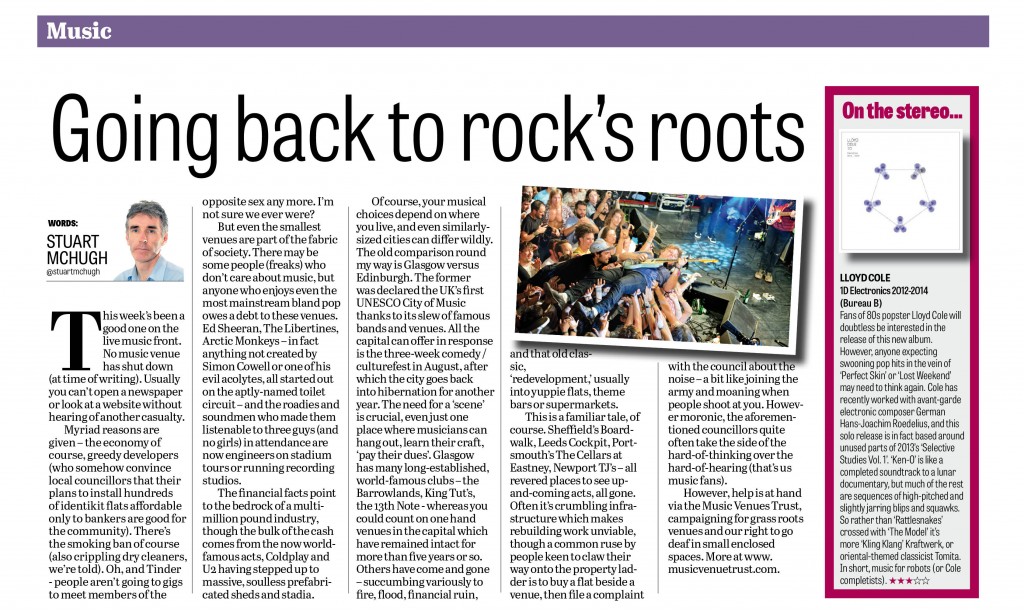This week’s been a good one on the live music front. No music venue has shut down (at time of writing). Usually you can’t open a newspaper or look at a website without hearing of another casualty.
Myriad reasons are given – the economy of course, greedy developers (who somehow convince local councillors that their plans to install hundreds of identikit flats affordable only to bankers are good for the community). There’s the smoking ban of course (also crippling dry cleaners, we’re told). Oh, and Tinder – people aren’t going to gigs to meet members of the opposite sex any more. I’m not sure we ever were?
But even the smallest venues are part of the fabric of society. There may be some people (freaks) who don’t care about music, but anyone who enjoys even the most mainstream bland pop owes a debt to these venues. Ed Sheeran, The Libertines, Arctic Monkeys – in fact
anything not created by Simon Cowell or one of his evil acolytes started out on the aptly-named toilet circuit – and the roadies and soundmen who made them listenable to three guys (and no girls) in attendance are now engineers on stadium tours or running recording studios.
The financial facts point to the bedrock of a multi-million pound industry, though the bulk of the cash comes from the now world-famous acts, Coldplay and U2 having stepped up to massive, soulless prefabricated sheds and stadia.
Of course, your musical choices depend on where you live, and even similarly-sized cities can differ wildly. The old comparison round my way is Glasgow versus Edinburgh. The former was declared the UK’s first UNESCO City of Music thanks to its slew of famous bands and venues. All the capital can offer in response is the three-week comedy / culturefest in August, after which the city goes back into hibernation for another year. The need for a ‘scene’ is crucial, even just one place where musicians can hang out, learn their craft, ‘pay their dues’. Glasgow has many long-established, world-famous clubs – the Barrowlands, King Tut’s, the 13th Note – whereas you could count on one hand venues in the capital which have remained intact for more than five years or so. Others have come and gone – succumbing variously to fire, flood, financial ruin, and that old classic, ‘redevelopment,’ usually into yuppie flats, theme bars or supermarkets.
This is a familiar tale, of course. Sheffield’s Boardwalk, Leeds Cockpit, Portsmouth’s The Cellars at Eastney, Newport TJ’s – all revered places to see up-and-coming acts, all gone. Often it’s crumbling infrastructure which makes rebuilding work unviable, though a common ruse by people keen to claw their way onto the property ladder is to buy a flat beside a venue, then file a complaint with the council about the noise – a bit like joining the army and moaning when people shoot at you. However moronic, the aforementioned councillors quite often take the side of the hard-of-thinking over the hard-of-hearing (that’s us music fans).
However, help is at hand via the Music Venues Trust, campaigning for grass roots venues and our right to go deaf in small enclosed
spaces. More at www.musicvenuetrust.com.
Lloyd Cole
1D Electronics 2012-2014
(Bureau B)
Fans of 80s popster Lloyd Cole will doubtless be interested in the
release of this new album. However, anyone expecting swooning pop hits in the vein of ‘Perfect Skin’ or ‘Lost Weekend’ may need to think again. Cole has recently worked with avant-garde electronic composer German Hans-Joachim Roedelius, and this solo release is in fact based around unused parts of 2013’s ‘Selective Studies Vol. 1’. ‘Ken-O’ is like a completed soundtrack to a lunar documentary, but much of the rest are sequences of high-pitched and slightly jarring blips and squawks. So rather than ‘Rattlesnakes’ crossed with ‘The Model’ it’s more ‘Kling Klang’ Kraftwerk, or oriental-themed classicist Tomita. In short, music for robots (or Cole completists). ***

